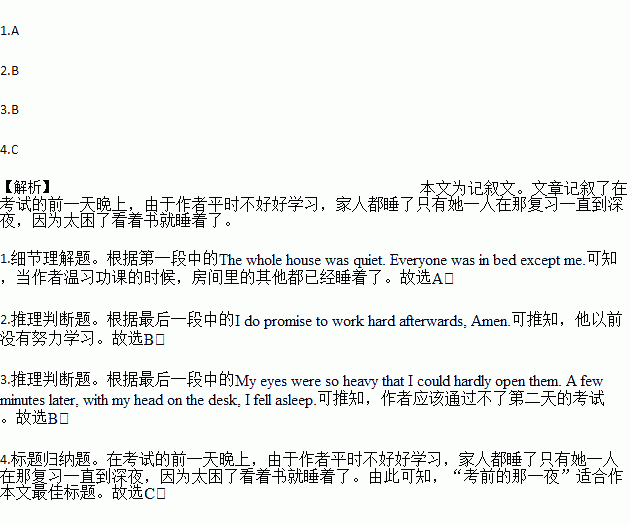题目内容
The clock struck eleven at night. The whole house was quiet. Everyone was in bed except me. Under the strong light, I looked sad before a huge pile of troublesome stuff that were called “books”. I was going to have my exam the next day. "When can I go to bed?" I asked myself. I didn’t answer; as a matter of fact, I dared not.
The clock struck twelve. "Oh, dear!" I cried, "five more books to read before I can go to bed!” We pupils are the poorest in the world. Dad does not agree with me on this. He did not have to work so hard when he was a boy.
The clock struck one. I was quite hopeless now. I forgot all I had learnt. I was too tired to go on. I did the only thing I could. I prayed, “Oh, God! Please help me pass the exam tomorrow. I do promise to work hard afterwards, Amen.” My eyes were so heavy that I could hardly open them. A few minutes later, with my head on the desk, I fell asleep.
1.When the author was going over his lessons, all the others in the house were ______.
A. asleep B. outside
C. working in bed D. quietly laughing at him
2.Reviewing his lessons didn’t help him because ______.
A. he was short of enough sleep
B. he hadn’t studied hard before
C. he got no help from roommates
D. he didn’t make the best of time
3.What do you suppose happened to the author?
A. He passed the exam by luck.
B. He failed in the coming exam.
C. He was punished by his teacher.
D. He went to a church to pray again.
4.The best title for the passage would be ______.
A. Working Far into the Night
B. A Slow Student in Studying
C. The Night Before the Exam
D. The Heavy Studying Burden
 阅读快车系列答案
阅读快车系列答案
